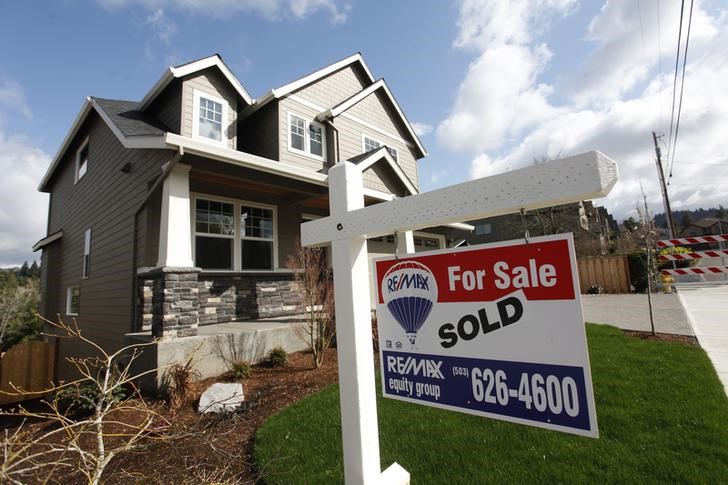By Andrea Hopkins
TORONTO, Oct 8 (Reuters) - Canadian housing starts surged
unexpectedly in September while new home prices also beat
forecasts in August, prolonging a housing boom in the country
despite signs of weakness in other parts of the economy.
Groundbreaking on new homes jumped to a seasonally adjusted
annual rate of 230,701 in September from a downwardly revised
214,255 in August, a report by the Canada Mortgage and Housing
Corp showed.
That puts housing starts at the highest since August 2012,
bucking forecasts for a slowing in construction to 200,000
starts, which economists have said is more in line with
demographic demand.
"In the span of about three months, Canadian homebuilding
activity has gone from a controlled simmer to a rolling boil,"
BMO Capital Markets senior economist Robert Kavcic said in a
research note.
"We probably can't sustain this level of homebuilding
activity for long before excess supply concerns start to build."
Canada's housing boom has defied predictions of a slowdown
for years, buoyed by historically low borrowing costs that have
offset slow economic growth and a technical recession in the
first half of 2015.
The Bank of Canada has cut rates twice this year to help
stimulate the resource-dependent economy amid weak oil prices.
The last time housing starts stayed well above 200,000 for a
prolonged period, the Canadian government tightened mortgage
lending rules to cool the market.
CMHC Chief Economist Bob Dugan said the projected annual
rate of new household formation is 190,000, which "underscores
the continuing need for inventory management to minimize the
number of completed but unsold units."
A separate report from Statistics Canada showed new home
prices rose by 0.3 percent in August from July on continued
strength in Ontario, the most populous of the 10 provinces. That
surpassed expectations for a 0.2 percent increase.
Compared with a year earlier, prices were up by 1.3 percent.
The Toronto and Oshawa region, which accounts for 28.8
percent of the entire Canadian market, posted a 0.6 percent
gain, advancing for a seventh month.
Prices in Vancouver, another hot market, edged up by 0.1
percent. The Alberta city of Calgary, which is sensitive to
Canada's weakened energy sector, showed no change from July.
- English (USA)
- English (UK)
- English (India)
- English (Australia)
- English (South Africa)
- English (Philippines)
- English (Nigeria)
- Deutsch
- Español (España)
- Español (México)
- Français
- Italiano
- Nederlands
- Português (Portugal)
- Polski
- Português (Brasil)
- Русский
- Türkçe
- العربية
- Ελληνικά
- Svenska
- Suomi
- עברית
- 日本語
- 한국어
- 简体中文
- 繁體中文
- Bahasa Indonesia
- Bahasa Melayu
- ไทย
- Tiếng Việt
- हिंदी
WRAPUP 1-Canada housing starts unexpectedly jump, new home prices gain
Published 2015-10-08, 09:43 a/m
WRAPUP 1-Canada housing starts unexpectedly jump, new home prices gain

Latest comments
Install Our App
Risk Disclosure: Trading in financial instruments and/or cryptocurrencies involves high risks including the risk of losing some, or all, of your investment amount, and may not be suitable for all investors. Prices of cryptocurrencies are extremely volatile and may be affected by external factors such as financial, regulatory or political events. Trading on margin increases the financial risks.
Before deciding to trade in financial instrument or cryptocurrencies you should be fully informed of the risks and costs associated with trading the financial markets, carefully consider your investment objectives, level of experience, and risk appetite, and seek professional advice where needed.
Fusion Media would like to remind you that the data contained in this website is not necessarily real-time nor accurate. The data and prices on the website are not necessarily provided by any market or exchange, but may be provided by market makers, and so prices may not be accurate and may differ from the actual price at any given market, meaning prices are indicative and not appropriate for trading purposes. Fusion Media and any provider of the data contained in this website will not accept liability for any loss or damage as a result of your trading, or your reliance on the information contained within this website.
It is prohibited to use, store, reproduce, display, modify, transmit or distribute the data contained in this website without the explicit prior written permission of Fusion Media and/or the data provider. All intellectual property rights are reserved by the providers and/or the exchange providing the data contained in this website.
Fusion Media may be compensated by the advertisers that appear on the website, based on your interaction with the advertisements or advertisers.
Before deciding to trade in financial instrument or cryptocurrencies you should be fully informed of the risks and costs associated with trading the financial markets, carefully consider your investment objectives, level of experience, and risk appetite, and seek professional advice where needed.
Fusion Media would like to remind you that the data contained in this website is not necessarily real-time nor accurate. The data and prices on the website are not necessarily provided by any market or exchange, but may be provided by market makers, and so prices may not be accurate and may differ from the actual price at any given market, meaning prices are indicative and not appropriate for trading purposes. Fusion Media and any provider of the data contained in this website will not accept liability for any loss or damage as a result of your trading, or your reliance on the information contained within this website.
It is prohibited to use, store, reproduce, display, modify, transmit or distribute the data contained in this website without the explicit prior written permission of Fusion Media and/or the data provider. All intellectual property rights are reserved by the providers and/or the exchange providing the data contained in this website.
Fusion Media may be compensated by the advertisers that appear on the website, based on your interaction with the advertisements or advertisers.
© 2007-2025 - Fusion Media Limited. All Rights Reserved.